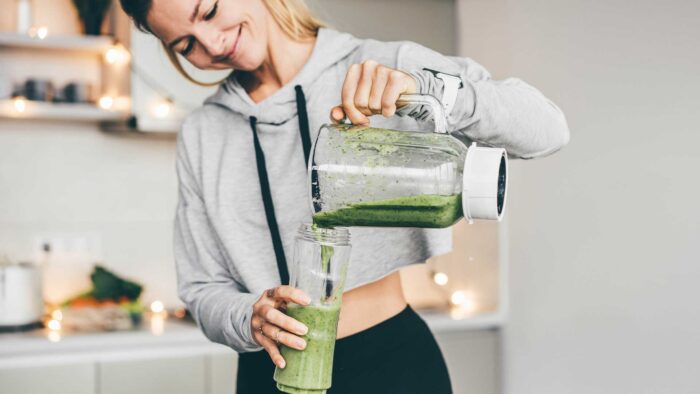Complete guide on how to naturally support your immunity
- READING TIME 12 MIN
- PUBLISHED November 02, 2023
- AUTHOR Donna
Key takeaways
- Immunity’s infrastructure is built upon a complex network of cells, organs, tissues and proteins, all working together to protect our bodies against foreign invaders.
- We don’t yet know everything about how the system works, including what’s the right amount and combination of immune cells that would provide optimal protection.
- That said, having a healthy lifestyle is still crucial for a well-functioning immune system.
- Some of the strategies that may support immunity are a well-balanced diet, exercise, good sleep, certain supplements and stress avoidance. Emerging research also suggests that using a sauna or going for a massage can benefit the strength of the immune system.
- One of the best and easiest ways to avoid getting ill in the first place, however, is to regularly and properly wash your hands.
Complete guide on how to naturally support your immunity
In healthy adults, the immune system is typically highly effective in protecting our bodies against germs and viruses. From time to time, however, a bad bacterium still finds a way in and may cause an infection and result in illness. Is there anything we can do to intervene in the process and make our immune system (even) more successful in fighting off invaders? Yes, but there’s a caveat.
Your body is generating all kinds of immune cells, each responding differently depending on the target it aims to neutralize. The immune system is therefore massively complex, and science doesn’t yet have a complete grasp on how it works. We know, however, that it’s not necessarily desirable to “boost” immunity by trying to multiply cells; in fact, it can be counterproductive, increasing the risk of health complications, according to Harvard Medical School. 1
Genetics plays a role, but the strength of immunity is mostly in our hands
That said, a healthy lifestyle is still crucial for supporting immune response and maintaining overall health. Indeed, research in twins shows that our immunity is mainly determined by non-inheritable factors such as level of personal hygiene, diet and vaccination status. 2 This means most of us can take measures to support our immune function and, with that, best protect ourselves against diseases.
There are many ways to perform the necessary upkeep of the immune system. On one hand, we should do everything we can to avoid harmful habits and toxins, and on the other side, embrace behaviors that support our body’s defenses. With that, let’s explore some of the better-researched strategies up close.

Start with a healthy and balanced diet
A healthy diet is essential for a high-powered immune response. The right nutrients help spur the creation of white blood cells which produce the antibodies which then fight the bacteria and viruses. 3 Vitamins A, B₆, B₁₂, C and D as well as copper, folate, iron and zinc are considered essential to keeping the immune system up and running. 4 These and other vitamins and minerals are also powerful antioxidants, which help to neutralize harmful free radicals in our bodies. Clinical trials have found that antioxidant supplementation can “significantly” improve an immune response. 5
Most nutrients are readily available in a healthy and balanced diet. The focus should be on high-fiber fruits and vegetables, nuts and seeds, whole grains, certain dairy products and fish or plant proteins like beans and lentils. Bell peppers, broccoli, spinach, chickpeas, oranges, bananas, apples, chicken breasts, tuna, beef liver, sunflower seeds and brown rice are just a few foods you should consider. 6
Keep in mind, however, that a healthy diet doesn’t encompass only what you eat but also the foods you avoid. Try to limit saturated fats, salt and sugar. The latter has been found to lower your white blood cell count and, as a result, may weaken the immune system. 7 , 8
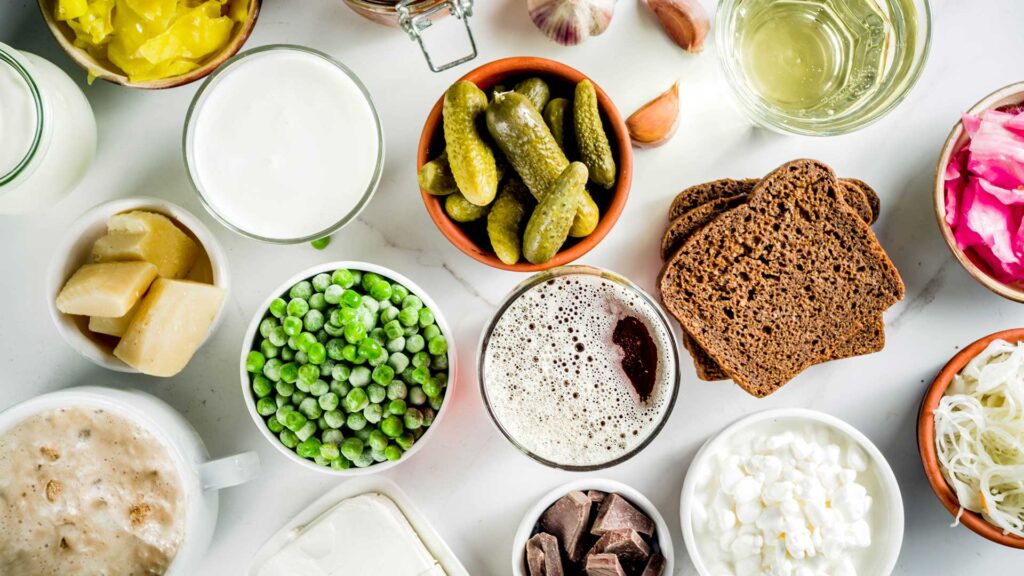
Probiotics help protect the “home” of immune cells
The strength of your immune system reflects the health of your gut as about 70 to 80 percent of immune cells live there. 9 One important way to take care of the gut is to regularly supply it with good bacteria which strengthens the barrier that’s protecting your immune system from pathogen invaders. These bacteria not only destroy disease-causing cells but also help digest food and produce vitamins. 10
Probiotics are a way to keep your gut microbiome. They come in the form of live bacteria and yeasts and can be found in all kinds of probiotic foods, like live yogurt, kefir, kimchi, kombucha, miso and tempeh. 11
It’s important that yogurts are ‘live’, meaning they’ve been fermented with live cultures. Choose unpasteurized and fermented foods and look for a digestive probiotic that has at least one billion or more colony-forming units (CFU).
Exercise can have huge benefits but moderation is key
Emerging studies show that exercise can increase the circulation of your immune cells and benefit immunity by improving your antibody response. 12
In addition, regular physical activity helps you feel better, reduces anxiety and ‘delays the onset of age-related dysfunction’, according to a study published in the Journal of Sport and Health Science. 13 Exercise can also help you sleep better, and sleep is a key element in strengthening immune function. 14
There are different guidelines on the amount of exercise per week, but, generally, healthy adults should aim for at least 150 minutes of moderate aerobic activity and 75 minutes of vigorous cardiovascular exercise. In addition, strength training can be very helpful, especially if you can do it twice per week. 15 However, it’s important not to exaggerate with workout – strenuous exercise without proper recovery can lead to an anti-inflammatory state and, as a result, to a lowered immune response. 16
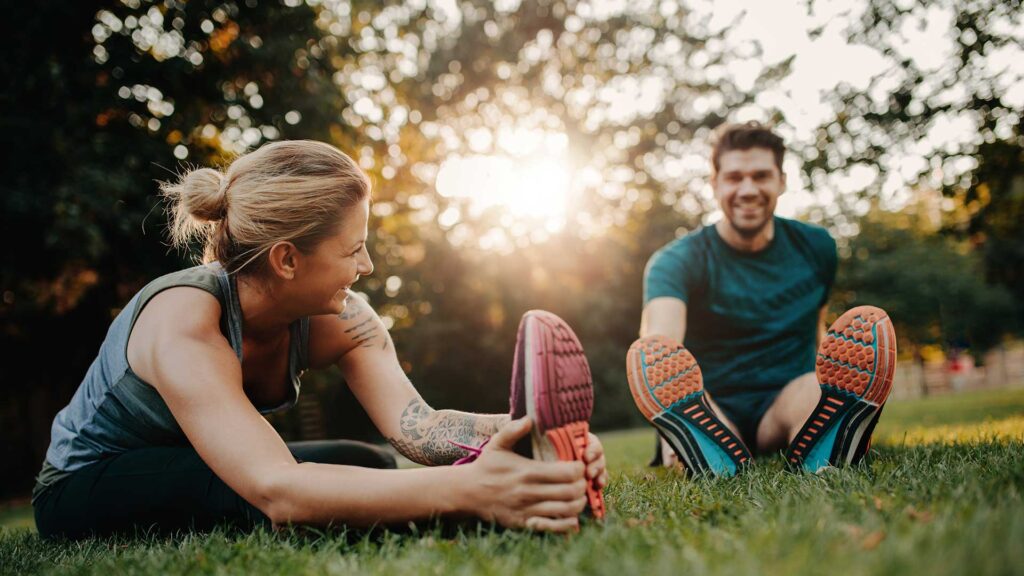
Make sure to get enough sleep
Sleep deprivation can also slow down your immune system by lowering the activity of T-cells, which are a type of white blood cells that activate other immune cells to produce antibodies. 17 When you’re sleeping, your immune system releases cytokines, an essential protein responsible for immune system cell growth. 18 Studies in identical twins have shown that those with better sleep had a healthier inflammatory and immune response than those with less sleep. 19
Sleep and immunity have a bidirectional relationship. 20 This means that good quality sleep can strengthen the immune system while viral infection can negatively affect sleep. Sleep deprivation causes the body to produce more cortisol, a stress hormone.
Aim for seven to eight hours of sleep on a regular basis and avoid all-nighters. Certain lifestyle adjustments can help you sleep better. For example, avoid drinking alcohol or caffeine too close to bedtime, find time to relax in the evening and stay away from screens at least an hour before going to bed.

Certain supplements can support your immune system
If you’re healthy, you’ll likely receive most of your nutrients from a well-balanced diet. That said, you could benefit from taking certain supplements, in particular vitamin D, vitamin B₁₂ and zinc.
Vitamin D is not abundant naturally and can only be found in specific foods such as red meat, beef liver, egg yolks and oily fish like salmon and sardines. It’s also formed in human skin under the influence of the sun’s ultraviolet light. 21
Lack of the vitamin is especially widespread in winter months. Adults need 10 micrograms a day which translates to around 400 international units (IU). 22
Vitamin B₁₂ is another powerhouse vitamin. Without it, your body might “drastically alter immune responses by affecting the production and activity of white blood cells”. 23 Receiving the needed amount can be trickier for the elderly and vegans as the vitamin is mostly found in meat, fish and dairy products. If these foods can’t be on your everyday menu, consider a supplement. Adults will need 1,5 micrograms a day. 24
Supplementing with zinc, meanwhile, may be beneficial for those who are already sick. A study of hospitalized children with acute lower respiratory tract infections showed that taking 30 micrograms of zinc per day decreased the total duration of infection and the duration of the hospital stay by an average of two days, compared with the placebo group. 25
Learn more about these and other essential vitamins in our article.

Stay hydrated
Drinking enough liquid and staying hydrated is crucial for your blood pumping, which is part of your immune function. Water also functions as a medium for transporting nutrients to organ systems, including ones for fighting off infections. In addition, proper hydration is vital for detoxification pathways and clearing out foreign invaders and other waste materials, according to the University of California, Irvine. 26
Dehydration, on the other hand, can have damaging results. One research of 25 university judoists after a judo practice session suggests that dehydration resulted in immunosuppression, including decreased neutrophil function. 27 Neutrophils are first-responder immune cells that also help strengthen the response of other immune cells.
How much water should you drink per day? Depends on the individual and their overall health, activity and environment. General guidelines suggest around eight glasses of water and other liquids such as herbal teas. 28 Drinking too much coffee and alcohol, on the other hand, has the opposite effect and typically contributes to dehydration.
Manage stress with meditation, exercise and therapy
Stress levels can also make a dent in the overall health of your immune system. 29 When under stress, your body releases cortisol, commonly known as the stress hormone. 30 , 31 Cortisol interferes with the ability of T-cells to proliferate and get signals from the body. It also lowers an important antibody, which lines the respiratory tract and gut, constituting our first line of immune defense.
Take steps to reduce stress in your day-to-day life. Common stress-relieving activities include meditation, workout, mindful breathing, taking up hobbies, therapy or just meeting with friends. A yoga session or a short course of meditation, for example, may already increase levels of antibodies and improve immune function. 32 , 33
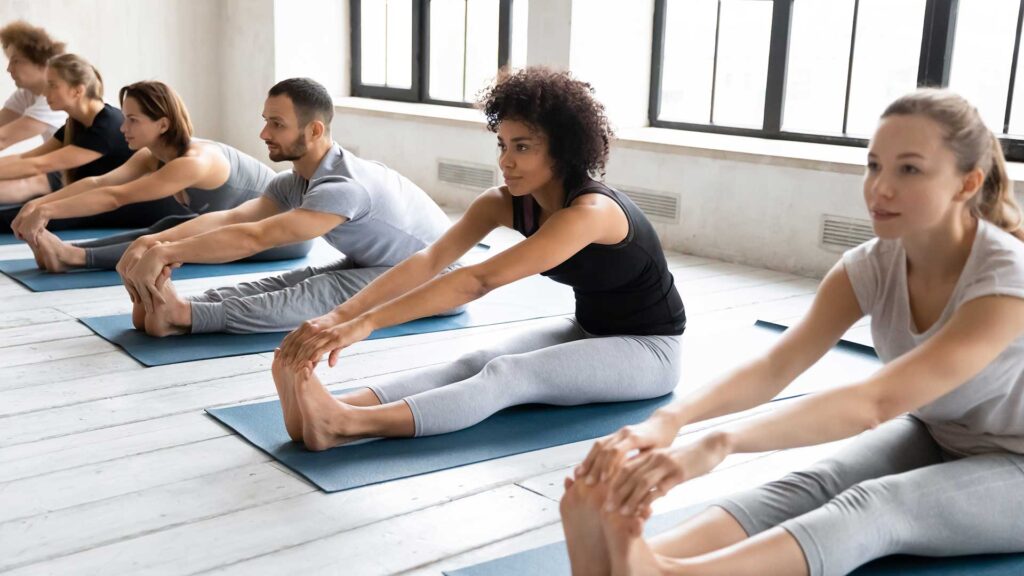
Avoid smoking and alcohol
This shouldn’t come as a huge surprise, but smoking is bad for you. It also harms the immune system, rendering the body less efficient at fighting diseases. 34 In addition, smoking compromises the immune system’s balance, which again increases the risk for immune and autoimmune disorders, research shows.
Alcohol can slow down your body’s defenses by damaging immune cells and making it harder for the immune system to do its job. It also aggravates inflammation and can kill off the good bacteria in your body that are important in the fight against infection. 35
Go for a massage…
In a 2010 study by Cedars-Sinai, one of the best hospital centers in the US, 29 people received 45 minutes of Swedish massage while 24 people received 45 minutes of light touch massage. Blood samples were collected from each person five minutes and one minute before the massage began. At the end of the massage session, blood samples were again collected one, five, 10, 15, 30 and 60 minutes after the massage. 36
The results of the research suggested that massages may assist lymphocytes, decrease cortisol, positively impact cytokines and reduce levels of the hormone vasopressin which is believed to play a role in aggressive behavior.
… and combine it with sauna
Sauna is a popular wellness activity with many proven benefits, including supporting your immunity. Studies have shown that going for an infrared sauna on a regular basis may improve the status of white blood cells and help enhance immunological defense.
Finnish saunas seem to have similar health advantages. In one study 18 individuals participated in 15-minute sauna sessions, with half of the participants being athletes. After the sauna session, researchers recorded an increased number of white blood cells, lymphocyte, neutrophil and basophil counts in the white blood cell profile. Higher counts in leukocytes and monocytes were observed in the group of athletes, compared to non-trained people. 37
In addition to increasing white cell production, sauna sweating also helps rid your body of toxins and may significantly reduce the duration and severity of common colds. 38
Avoid infection with proper hygiene
One of the best and easiest ways to avoid getting ill in the first place is by good old handwashing. Proper hygiene is also very effective – it has been found that it reduces diarrheal illness in people with weakened immune systems by 58 percent and respiratory illnesses in the general population by 16 percent. 39 , 40 Washing your hands helps minimize the spread of germs and keeps them from getting into the body through your eyes, nose or mouth. To ensure you do it thoroughly enough, spend at least 20 seconds washing your hands with warm water and soap. 41
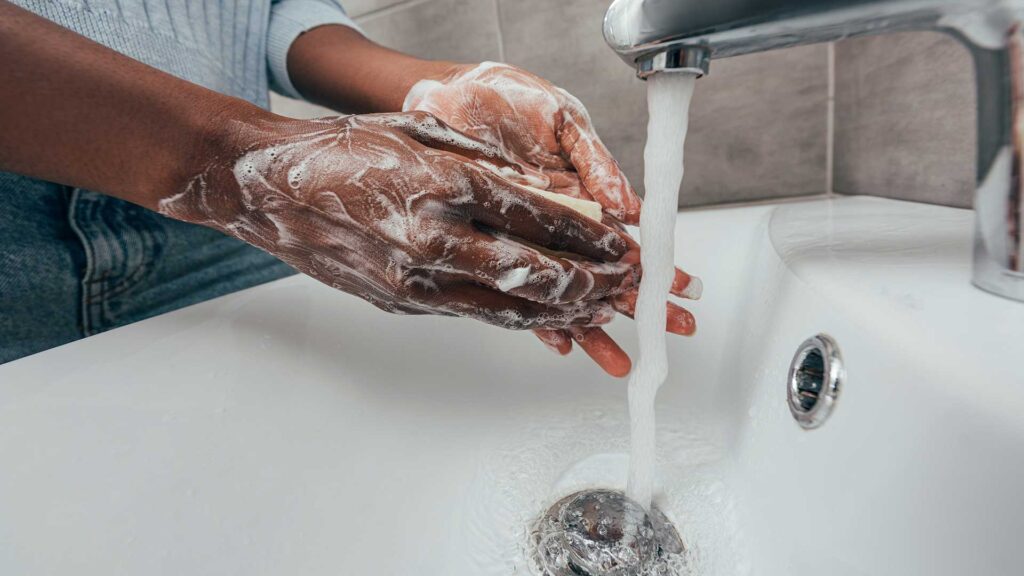
Although studies 42 are clear that maintaining personal hygiene is one of the best bulwarks against spreading infectious diseases, some are wondering if there’s a limit to how clean you can be. However, there’s no real evidence that excessive hand-washing could be detrimental to your immune health, so keep on scrubbing and soaping. 43
These are our science-backed suggestions that could help build your immunity. But how do you know if your body’s resistance to diseases is a bit off to start with? To find out more about signs that point to a weakened immune system, read our dedicated article.
REFERENCES
- https://www.health.harvard.edu/staying-healthy/how-to-boost-your-immune-system
- https://www.ncbi.nlm.nih.gov/pmc/articles/PMC4302727/
- https://www.ncbi.nlm.nih.gov/pmc/articles/PMC9083862/
- https://www.ncbi.nlm.nih.gov/pmc/articles/PMC7019735/
- https://pubmed.ncbi.nlm.nih.gov/8227682/
- https://health.clevelandclinic.org/vitamins-best-boosting-immunity/
- https://pubmed.ncbi.nlm.nih.gov/32395846/
- https://pubmed.ncbi.nlm.nih.gov/29727694/
- https://pubmed.ncbi.nlm.nih.gov/33803407/
- https://www.nccih.nih.gov/health/probiotics-what-you-need-to-know
- https://www.livescience.com/6-probiotic-foods-to-support-your-gut
- https://www.ncbi.nlm.nih.gov/pmc/articles/PMC6523821/
- https://www.sciencedirect.com/science/article/pii/S2095254618301005
- https://www.hopkinsmedicine.org/health/wellness-and-prevention/exercising-for-better-sleep
- https://www.heart.org/en/healthy-living/fitness/fitness-basics/aha-recs-for-physical-activity-in-adults
- https://www.sciencedirect.com/science/article/abs/pii/S1043466617302922?via%3Dihub
- https://www.cdc.gov/niosh/work-hour-training-for-nurses/longhours/mod2/05.html
- https://www.mayoclinic.org/diseases-conditions/insomnia/expert-answers/lack-of-sleep/faq-20057757
- https://academic.oup.com/sleep/article/doi/10.1093/sleep/zsw019/2952682/Transcriptional-Signatures-of-Sleep-Duration
- https://pubmed.ncbi.nlm.nih.gov/30920354/
- https://www.hsph.harvard.edu/nutritionsource/vitamin-d/
- https://www.nhs.uk/conditions/vitamins-and-minerals/vitamin-d/
- https://www.livescience.com/which-vitamins-boost-the-immune-system
- https://www.nhs.uk/conditions/vitamins-and-minerals/vitamin-b/
- https://www.ncbi.nlm.nih.gov/pmc/articles/PMC6548996/
- https://ssihi.uci.edu/tip/hydration-for-immune-system/
- https://pubmed.ncbi.nlm.nih.gov/22362640/
- https://www.mayoclinic.org/healthy-lifestyle/nutrition-and-healthy-eating/in-depth/water/art-20044256
- https://pubmed.ncbi.nlm.nih.gov/31125426/
- https://www.ncbi.nlm.nih.gov/pmc/articles/PMC7882157/
- https://health.clevelandclinic.org/what-happens-when-your-immune-system-gets-stressed-out/
- https://www.pnas.org/doi/10.1073/pnas.2110455118
- https://www.ncbi.nlm.nih.gov/labs/pmc/articles/PMC8842003/
- https://www.cdc.gov/tobacco/sgr/50th-anniversary/pdfs/fs_smoking_overall_health_508.pdf
- https://www.ncbi.nlm.nih.gov/pmc/articles/PMC4590612/
- https://www.cedars-sinai.org/newsroom/adults-demonstrate-modified-immune-response-after-receiving-massage-cedars-sinai-researchers-show/
- https://www.ncbi.nlm.nih.gov/pmc/articles/PMC3916915/
- https://pubmed.ncbi.nlm.nih.gov/2248758/
- https://www.cdc.gov/handwashing/wcms-inc/global_handwashing_day.html
- https://pubmed.ncbi.nlm.nih.gov/24889816/
- https://www.nhs.uk/live-well/best-way-to-wash-your-hands/
- https://www.ncbi.nlm.nih.gov/pubmed/18556606
- https://health.clevelandclinic.org/can-being-too-clean-weaken-your-immune-system/
RELATED ARTICLES
Explore more
Feed your curiosity with more content. Dive deeper and explore our selected articles, curated just for you.



